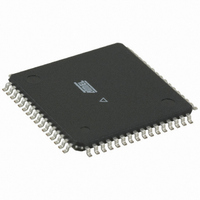ATSAM3S1BA-AU Atmel, ATSAM3S1BA-AU Datasheet - Page 488

ATSAM3S1BA-AU
Manufacturer Part Number
ATSAM3S1BA-AU
Description
IC MCU 32BIT 64KB FLASH 64LQFP
Manufacturer
Atmel
Series
SAM3Sr
Specifications of ATSAM3S1BA-AU
Core Processor
ARM® Cortex-M3™
Core Size
32-Bit
Speed
64MHz
Connectivity
I²C, MMC, SPI, SSC, UART/USART, USB
Peripherals
Brown-out Detect/Reset, DMA, I²S, POR, PWM, WDT
Number Of I /o
47
Program Memory Size
64KB (64K x 8)
Program Memory Type
FLASH
Ram Size
16K x 8
Voltage - Supply (vcc/vdd)
1.62 V ~ 1.95 V
Data Converters
A/D 10x10/12b, D/A 2x12b
Oscillator Type
Internal
Operating Temperature
-40°C ~ 85°C
Package / Case
64-LQFP
Controller Family/series
ATSAM3S
No. Of I/o's
47
Ram Memory Size
16KB
Cpu Speed
64MHz
No. Of Timers
6
Rohs Compliant
Yes
Processor Series
ATSAM3x
Core
ARM Cortex M3
3rd Party Development Tools
JTRACE-CM3, MDK-ARM, RL-ARM, ULINK2
Development Tools By Supplier
ATSAM3S-EK
Lead Free Status / RoHS Status
Lead free / RoHS Compliant
Eeprom Size
-
Lead Free Status / Rohs Status
Details
Available stocks
Company
Part Number
Manufacturer
Quantity
Price
- Current page: 488 of 1118
- Download datasheet (24Mb)
Figure 28-4. Output Line Timings
28.5.8
28.5.9
488
488
Write PIO_ODSR at 1
Write PIO_ODSR at 0
Write PIO_CODR
Write PIO_SODR
SAM3S Preliminary
SAM3S Preliminary
Inputs
Input Glitch and Debouncing Filters
PIO_ODSR
PIO_PDSR
MCK
The level on each I/O line can be read through PIO_PDSR (Pin Data Status Register). This reg-
ister indicates the level of the I/O lines regardless of their configuration, whether uniquely as an
input or driven by the PIO controller or driven by a peripheral.
Reading the I/O line levels requires the clock of the PIO controller to be enabled, otherwise
PIO_PDSR reads the levels present on the I/O line at the time the clock was disabled.
Optional input glitch and debouncing filters are independently programmable on each I/O line.
The glitch filter can filter a glitch with a duration of less than 1/2 Master Clock (MCK) and the
debouncing filter can filter a pulse of less than 1/2 Period of a Programmable Divided Slow
Clock.
The selection between glitch filtering or debounce filtering is done by writing in the registers
PIO_IFSCDR (PIO Input Filter Slow Clock Disable Register) and PIO_IFSCER (PIO Input Filter
Slow Clock Enable Register). Writing PIO_IFSCDR and PIO_IFSCER respectively, sets and
clears bits in PIO_IFSCSR.
The current selection status can be checked by reading the register PIO_IFSCSR (Input Filter
Slow Clock Status Register).
For the debouncing filter, the Period of the Divided Slow Clock is performed by writing in the DIV
field of the PIO_SCDR (Slow Clock Divider Register)
Tdiv_slclk = ((DIV+1)*2).Tslow_clock
When the glitch or debouncing filter is enabled, a glitch or pulse with a duration of less than 1/2
Selected Clock Cycle (Selected Clock represents MCK or Divided Slow Clock depending on
PIO_IFSCDR and PIO_IFSCER programming) is automatically rejected, while a pulse with a
duration of 1 Selected Clock (MCK or Divided Slow Clock) cycle or more is accepted. For pulse
durations between 1/2 Selected Clock cycle and 1 Selected Clock cycle the pulse may or may
• If PIO_IFSCSR[i] = 0: The glitch filter can filter a glitch with a duration of less than 1/2 Period
• If PIO_IFSCSR[i] = 1: The debouncing filter can filter a pulse with a duration of less than 1/2
of Master Clock.
Period of the Programmable Divided Slow Clock.
APB Access
2 cycles
APB Access
2 cycles
6500C–ATARM–8-Feb-11
6500C–ATARM–8-Feb-11
Related parts for ATSAM3S1BA-AU
Image
Part Number
Description
Manufacturer
Datasheet
Request
R

Part Number:
Description:
KIT EVAL FOR ATSAM3S4C
Manufacturer:
Atmel
Datasheet:

Part Number:
Description:
Development Boards & Kits - ARM EVAL KIT SAM3S8 & SAM3SD8 series
Manufacturer:
Atmel
Datasheet:

Part Number:
Description:
AT91 ARM Cortex M3-based Processor
Manufacturer:
ATMEL [ATMEL Corporation]
Datasheet:

Part Number:
Description:
DEV KIT FOR AVR/AVR32
Manufacturer:
Atmel
Datasheet:

Part Number:
Description:
INTERVAL AND WIPE/WASH WIPER CONTROL IC WITH DELAY
Manufacturer:
ATMEL Corporation
Datasheet:

Part Number:
Description:
Low-Voltage Voice-Switched IC for Hands-Free Operation
Manufacturer:
ATMEL Corporation
Datasheet:

Part Number:
Description:
MONOLITHIC INTEGRATED FEATUREPHONE CIRCUIT
Manufacturer:
ATMEL Corporation
Datasheet:

Part Number:
Description:
AM-FM Receiver IC U4255BM-M
Manufacturer:
ATMEL Corporation
Datasheet:

Part Number:
Description:
Monolithic Integrated Feature Phone Circuit
Manufacturer:
ATMEL Corporation
Datasheet:

Part Number:
Description:
Multistandard Video-IF and Quasi Parallel Sound Processing
Manufacturer:
ATMEL Corporation
Datasheet:

Part Number:
Description:
High-performance EE PLD
Manufacturer:
ATMEL Corporation
Datasheet:

Part Number:
Description:
8-bit Flash Microcontroller
Manufacturer:
ATMEL Corporation
Datasheet:











